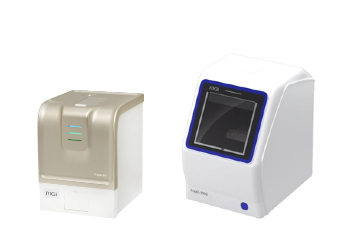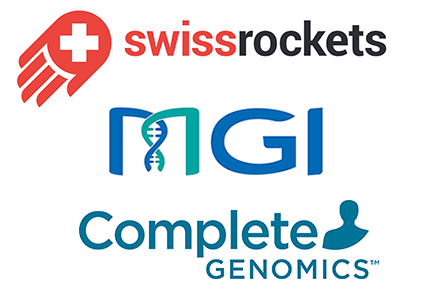On International Women's Day, we want to celebrate women’s contributions and achievements in science, reduce stereotypes and discrimination against women in science. Women have led ground-breaking research into public health, vaccines, treatments, and innovative technology and have been on the front lines of the COVID-19 response as scientists, healthcare workers, and more.
In recognition of women in Genomics and their fantastic work, we had a chat with Dr. Riddhi Patel, Senior Manager, Application Support Department EUAF who is based in Berlin and joined MGI in July 2019, about her story of falling in love with genomics.

Could you give a brief introduction of yourself and how did you get into the field of genomics?
Riddhi: Since high school, I have been biased toward Biology. I decided to pursue a Bachelor's in Biochemistry and a master's in biotechnology. After that, I sought in-depth knowledge of Molecular Genetics, so I joined a Post-master's Diploma in Genetic Engineering and did some internships at Medical Genetic labs to gain hands-on experience. My first job was at the Government department of Biotechnology in India, where I had the privilege to learn Next Generation Technology in the early time (2010-2011) of the Genomics Era. After two years at this job, I moved to Germany for my Ph.D., which was all about Genomics, especially Museum Genomics.
Could you tell us more about your current research/work?
Riddhi: I am taking care of the Europe-Africa business region through the Application Support Department at MGI. My team has 31 team members currently, based across different countries in Europe and Africa. We deal with technology and product training for researchers and diagnostic service providers in all fields. While working in the commercial sector, I can stay close to Genomics and Biology in a broad term. I also have the fantastic opportunity to work with such a diverse team and work culture, which helps me to grow as a human.
Why has genome sciences intrigued you so much? What’s the most exciting part?
Riddhi: I was always fascinated by biology and nature. Studying for many years in this subject made me more curious to learn every day. The most exciting part is that since the implication of genomics directly affects every lifeform’s health, even a tiny contribution from anyone of us may give new life to someone or something.
Genomics has always been considered to be a male-dominated field. It would not have been easy to start a career in this industry. What challenges did you face, and how did you overcome them?
Riddhi: Isn’t every field considered male-dominated? I would say, up to a certain level of the professional hierarchy or job titles, Biology/Genomics has a good ratio of female vs. male. While in any other field, like teaching or heading a department or c-suit level in academia or industry, one would find fewer females. I did not pay much attention and gave my 100% to reach where I am.
Do you feel that your gender gives you a different perspective and experience from your male counterparts? Any advantages?
Riddhi: I am a true believer and utterly biased about the female gender perspective in everything. Nature created our sub-species (female) with many hormones and much more complex biology; if we put this to constructive use, we can be superhumans. You must have heard about how good females are at multitasking, and it is of utmost importance to lead with empathy. EQ is as important as IQ. So, I believe this can be an advantage, and I strongly advocate for gender equality in any team (my team has 50% males and 50% females) to keep the dynamics in balance.
What changes are needed, in your opinion, to improve gender equality in science? And if you can change something about how women scientists are perceived in the science community. What would that be?
Riddhi: In my perspective, right from an early age, girls need to be taught that they can do as much as anyone else (I would not see gender as binary as I live in Berlin). They should be exposed to various roles in life and fed with a strong feeling of independence. We must be loud about how women should constructively use their differences from their counterparts. We have so many role models to look up to in this era.
Do you have any female scientist role models you look up to, and what message do you want to pass on to young women thinking about pursuing a career in the genomics industry?
Riddhi: I look up to all female leaders in all fields because they all have done phenomenal work from where they stand (but if I have to name a few – Indra Nooyi, Michelle Obama, Kiran Mazumdar, Özlem Türeci, Jacinda Ardern, Angela Markel, Hui Jiang – how can I forget our COO!). I would say to young women that we can do it all and have it all, don’t let anyone else tell you otherwise. If you want to achieve great heights, you have to work hard, and it will be a bumpy ride, but aim high and go for it.
What achievements are you most proud of in the genome sciences, and why did you choose to join MGI?
Riddhi: I am proud of my Ph.D. work the most, along with all other projects and research work I have contributed to, but now I am also proud of my work at MGI. I am so glad to have an amazing team to take care of. I chose MGI initially because of its unique technology in the NGS field and because I wanted to experience working with an international team and embrace different work cultures. It is fascinating as I work with colleagues from almost 25 countries.
Looking ahead, what work are you most excited about at MGI?
Riddhi: MGI has been one of the few companies in the Genomics era. As this field is at its peak, many new companies with newer technology are coming into the picture. This competition will encourage us to think more and put more effort in all directions. I am looking forward to it the most.
Aside from your research, what else do you do for fun?
Riddhi: Does 'being pregnant and working' count as fun? All my spare time goes into keeping a life growing inside me. But I love reading and knitting when I get time apart from my research and personal health.



 Sequencer Products: SEQ ALL
Sequencer Products: SEQ ALL















 Technologies
Technologies Applications
Applications Online Resources
Online Resources Data Bulletins
Data Bulletins Service & Support
Service & Support Global Programs
Global Programs Introduction
Introduction Newsroom
Newsroom Doing Business With Us
Doing Business With Us Creative Club
Creative Club













